A Decade of Denial
The University of Northern Iowa matriculated African American students as early as the 1930s, providing important opportunities for African American students to enroll in college. Up until the late 1950s the general attitude of students at UNI towards race was that it was a purely Southern issue. Nevertheless, many African American students experienced alienation and discrimination on campus.1
During the early 1960s, the University created a narrative that few instances of racial discrimination occurred on or around campus, a narrative challenged by the school’s African American students.2 Repeatedly, students filed reports of racial discrimination perpetrated by faculty members, citizens of Cedar Falls, and classmates.3 Repeatedly, the University swept these allegations aside. When a report on racism in university graduate and international student housing was presented to the faculty senate in 1964, they voted to table until spring of the following year.4 It was not resolved until 1966 when the University passed a nondiscrimination pledge.5
The assassination of Martin Luther King Jr. in 1968 prompted a wave of student engagement and demonstrations in support of the civil rights movement.6 Some members of the community cried for an end to the “tension” on campus and wished all students to “join together in unity.” Others, including Sylvia Kinkead disagreed. In a letter to the editor Syliva wrote, “…the institutional racism is camouflaged beneath benevolent-liberalistic platitudes which never get out of dorm room discussion.”7
On November 6th, 1969, the Afro-American Society of UNI presented a list of seven demands to William Lang, vice president of student affairs.8 The demands concerned resolutions passed by the Committee on University Responsibility in Minority Group Education. The Afro-American Society asked for immediate action on several issues of racial discrimination. When these demands were not met by the university the society organized a boycott of the union to protest the lack of response.
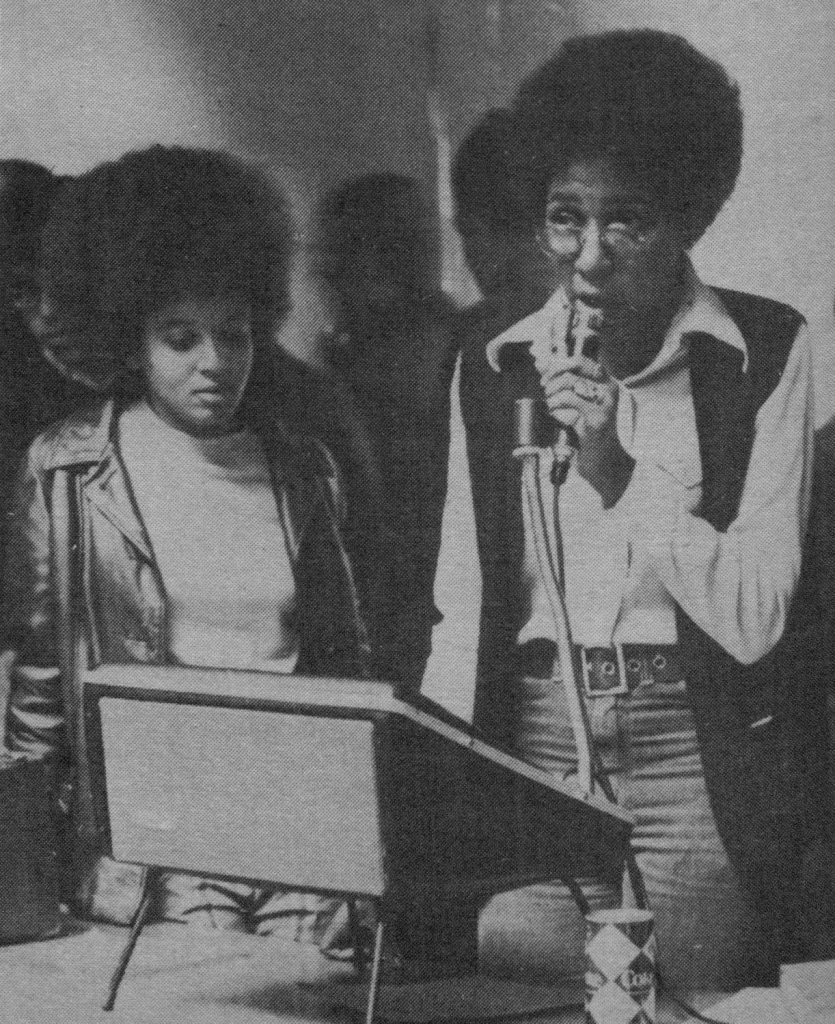
1960s: A Timeline

Ellabelle Davis, a Black opera singer, performs a concert on campus on January 16.10
Survey of Campus Opinion
A survey published in college eye finds that 20% of UNI students believed in segregation on interstate travel, and 84% agreed that poll taxes should be abolished.11
Dr. O.R. Johnson Speaks on Campus
Dr. O.R. Johnson of Atlanta University talks about the rising desegregation movement in the South and a shift of opinion from an acceptance of the “separate but equal” doctrine to a growing demand for desegregation.12
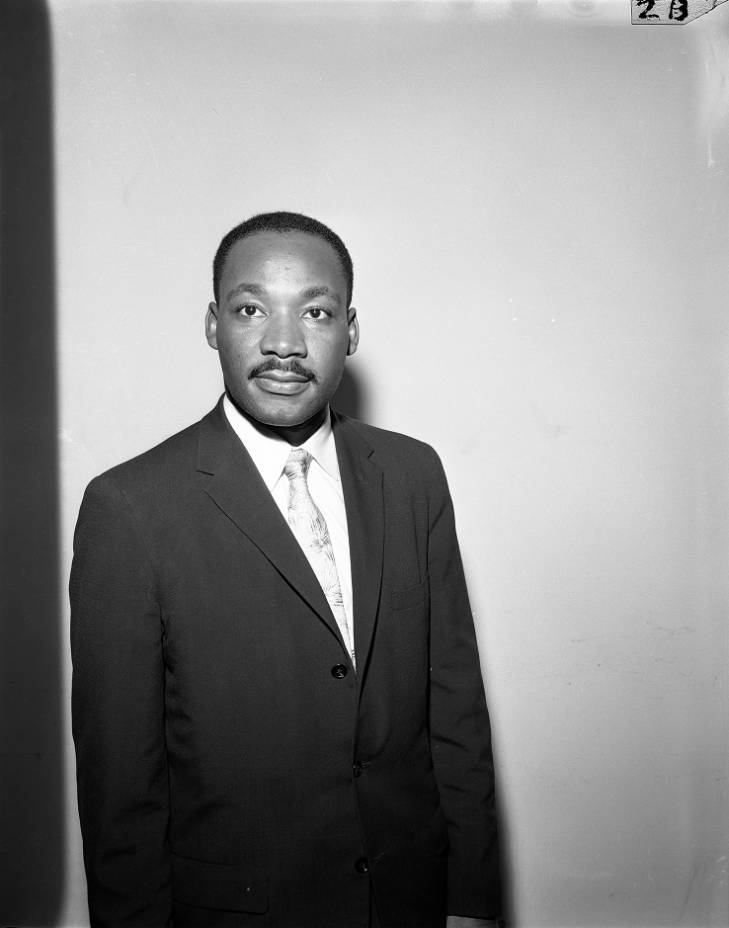
Rev. Dr. Martin Luther King Jr. visits campus
articles announcing the visit were very short and not given much emphasis. According to the article “King Tells Bus Boycott Culture to Full House Wednesday” the speech was well attended and packed to standing room.13
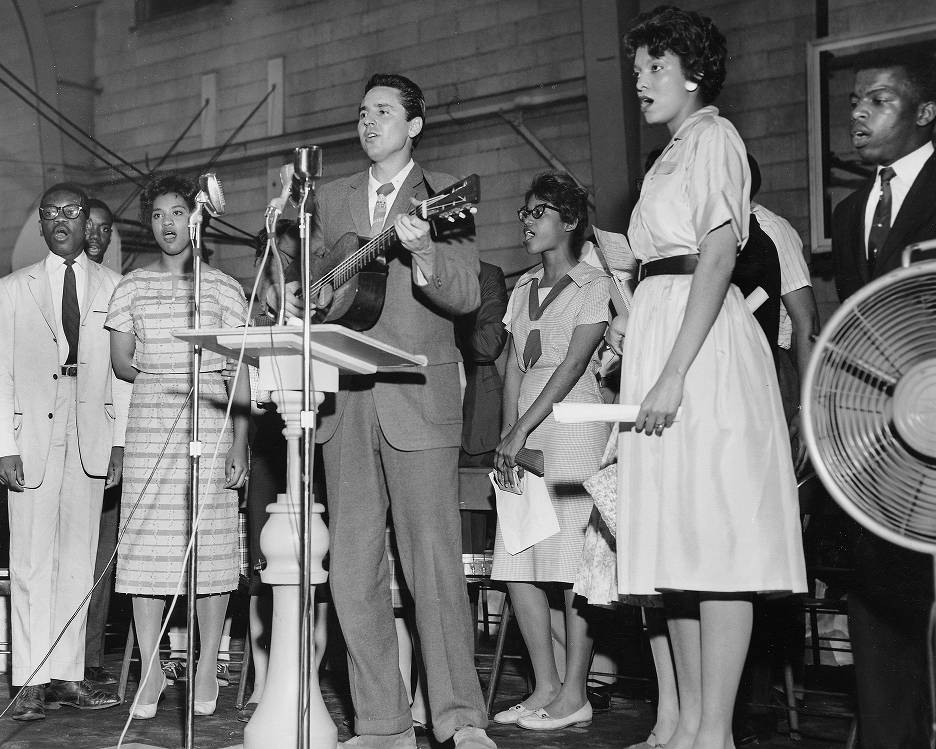
Folk singer and activist Guy Carawan visits campus
During his time on campus Carawan gives a presentation on the Freedom Riders and performs a concert.14
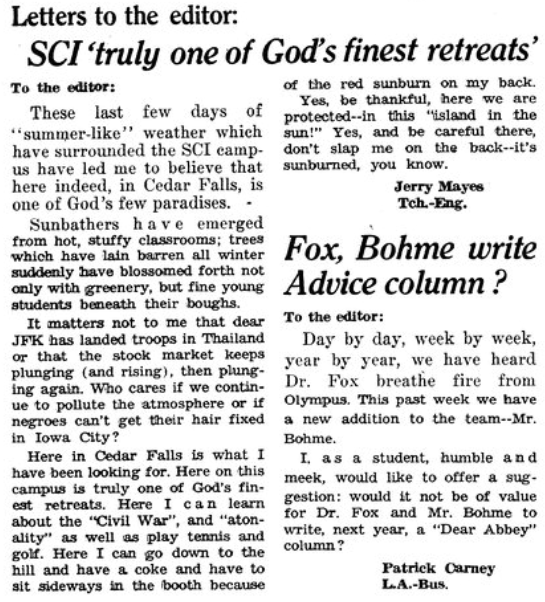
“SCI ‘Truely One of God’s Retreats'”
In a letter to the editor expressing happiness about the sheltered quality of life on the SCI campus, Jerry Mayes states, “It matters not to me that dear JFK has landed troops in Thailand or that the stock market keeps plunging (and rising), then plunging again. Who cares if we continue to pollute the atmosphere or if negroes can’t get their hair fixed in Iowa City?”15
“Neith Calls For Letters to Senators on Civil Rights”
In a letter to the editor, English student John Neith encourages students to write to Iowa’s Representatives and Senators to demand support for the Kennedy Administration’s civil rights bill.16
“328 Sign Petition for Civil Rights”
328 students and faculty members signed a petition “urging the strengthening of the Civil Rights Bill currently before Congress.” The petition asks that a Federal Fair Employment Practices Commission be added as a requirement of the bill. It also calls for “a provision enabling the Attorney General to initiate civil suits on behalf of Americans who are denied constitutional rights because of race or religion.17
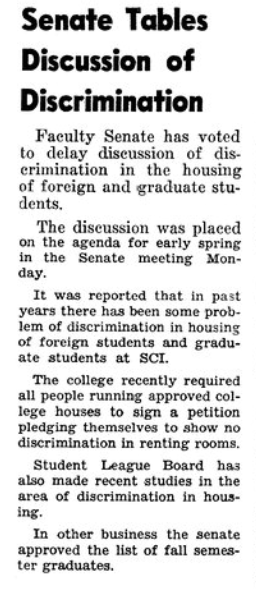
Faculty Senate votes to table talks on discrimination occurring in SCI housing for graduate and foreign students.18
In support of H.R. 7152, the Civil Rights Act of 1964, a group of students and faculty members organize marches and letter writing campaigns to state senators.
Responses to these demonstrations were mixed, with some students writing a letter to the editor claiming that a majority of students did not agree with H.R. 7152.19
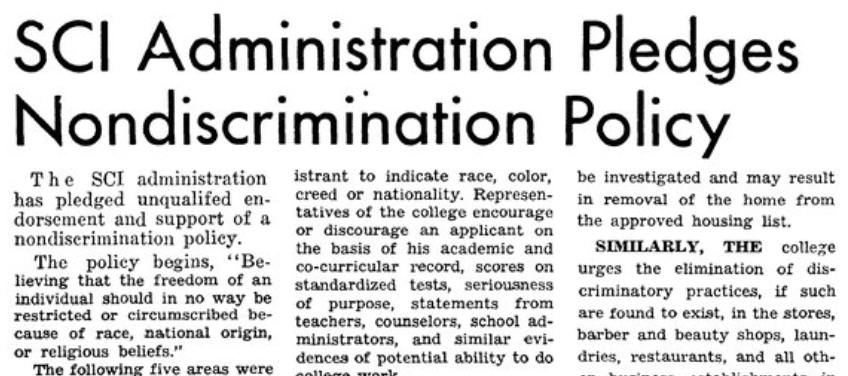
The State College of Iowa approves of a Nondiscrimination policy.20
Russ James, Waterloo Commission on Human Rights, charges that UNI isn’t living up to their nondiscrimination statement.
James made several points against the policy and how it was being upheld, primarily regarding the school’s “non-involvement” approach.21
Rev. Dr. Martin Luther King Jr. assassinated in Memphis
His death brings out discussions of “unifying” campus, but others believe that the message is saccharine. Sylvia Kinkead wrote in the Northern Iowa, “Institutional racism is camouflaged beneath benevolent-liberalistic platitudes which never get out of dorm room discussion.”22
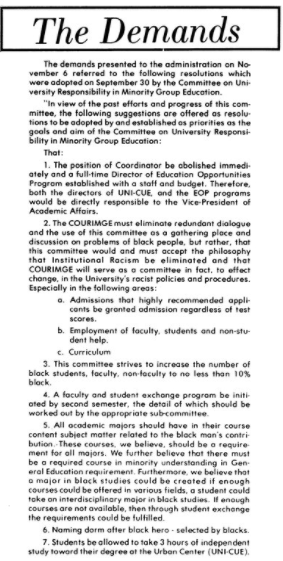
List of 7 Demands Presented to COURMAGE and Vice President of Academic Affairs, William Lang.23
Footnotes
- Jack Abramowitz, “Democratic Liberties Defended By Writer,” The College Eye, July 18, 1941, p. 4.; Jack Abramowitz, “Iowa Foreigners Scathed ,” College Eye, June 27, 1941, p. 2.; “Are You Anti-American,” The College Eye, November 11, 1920, p. 4.; Lee Hillsten, “Survey of Campus Opinion,” College Eye, August 6, 1948, pp. 2.; Meyerholz, “Cry, The Beloved College,” The College Eye, December 14, 1956, p. 2.; “Y Study Classes. Inter-Racial.,” The College Eye, April 20, 1921, p. 3.; “Racial Groups Rated By Students Of Two Classes,” The College Eye, February 23, 1940, p. 2.; “Undesirable Citizens,” The College Eye, September 24, 1919, p. 4.; Frances Wheeler, “The Challenge to the White Race,” The College Eye, February 21, 1923, p. 2.; “Will Our Fight For Freedom Become A Racial War?,” The College Eye, September 25, 1942, p. 2.; “Johnson Tells of Negro Revolution,” College Eye, March 16, 1956, pp. 8.; “King Tells Bus Boycott Story to Full House Wednesday,” College Eye, November 13, 1959, pp. 4.; Grace Neff, “Readers’ Review,” The College Eye, September 29, 1944, p. 2.; “Race Prejudice to Be Discussed,” College Eye, February 27, 1942, p. 3.; “Rev. Martin Luther King to Discuss Racial Issues,” College Eye, November 6, 1959, p. 4.; “Southern Racial Leader the ‘American Gandhi,’” College Eye, October 30, 1959, pp. 1.
- “Anti-Education Legislature Is Worst of Ole Miss Ills,” The College Eye, November 2, 1962, p. 2.; Jerry Mayes, “SCI ‘Truly One of God’s Finest Retreats’,” The College Eye, May 25, 1962.
- “328 Sign Petition for Civil Rights,” The College Eye, October 25, 1963, p. 4.; “328 Sign Petition for Civil Rights,” The College Eye, October 25, 1963, p. 4.; John Neith, “Neith Calls for Letters To Senators on Civil Rights,” The College Eye, July 28, 1963, p. 2.; “SLB Changes Rule For Purple Key Honor,” The College Eye , October 25, 1963, p. 8.
- “Senate Tables Discussion of Discrimination,” The College Eye, January 10, 1964, p. 3.
- “SCI Administration Pledges Nondiscrimination,” The College Eye, April 29, 1966, p. 5.
- Lorraine Boissoneault, “Martin Luther King Jr.’s Assassination Sparked Uprisings in Cities Across America,” Smithsonian Magazine (Smithsonian Institute, April 4, 2018), https://www.smithsonianmag.com/history/martin-luther-king-jrs-assassination-sparked-uprisings-cities-across-america-180968665/.
- Lynn Allen, “An Appeal In Black And White,” Northern Iowan, April 30, 1968, p. 2.; Dwight Bachman, “Bachman: ‘Black Is Beautiful’ ,” Northern Iowan , April 9, 1968, pp. 2.; David Crownfield, “In Memoriam,” Northern Iowan, April 9, 1968, p. 2.; Mike Hanna, “As The Nation Mourns,” Northern Iowan, April 9, 1968, pp. 2-3.; Carol Hansen, “Hansen: ‘Human Is Beautiful’,” Northern Iowan, April 12, 1968, p. 3.; Sylvia Kinkead, “Guilty As Charged,” Northern Iowan, April 12, 1968, p. 3.; Julius Wiesenfeld, “’Terrible But Ordinary Tragedy’,” Northern Iowan, April 9, 1968, p. 2.
- “Blacks Demand Action On Resolutions,” Northern Iowan, November 11, 1969, pp. 1-6.; David G. Sparks, “Untitled,” Northern Iowan, November 11, 1969, p. 7.
- David G. Sparks, “Untitled,” Northern Iowan, November 11, 1969, p. 7.; Leziga Barikor, “UNI 7: Activism Impacts Campus Nearly Half a Century Later,” Northern Iowan, April 4, 2016, https://www.northerniowan.com/3963/showcase/uni-7-activism-impacts-campus-nearly-half-a-century-later/#.
- “Davis Substitutes For Lotte Lehman In Concert Series.” The College Eye. January 10, 1947.; Valente, Alfredo. Ellabelle Davis. Photograph. Detroit. Detroit Public Library. Accessed February 25, 2022. https://digitalcollections.detroitpubliclibrary.org/islandora/object/islandora%3A198857.
- Hillsten, Lee. “Survey of Campus Opinion.” The College Eye. August 6, 1948.
- “Johnson Tells of Negro Revolution.” The College Eye. March 16, 1956.
- “King Tells Bus Boycott Story to Full House Wednesday,” College Eye, November 13, 1959, pp. 4.; “Rev. Martin Luther King to Discuss Racial Issues,” College Eye, November 6, 1959, p. 4.; “Southern Racial Leader the ‘American Gandhi,’” College Eye, October 30, 1959, pp. 1.; Shealy, Bud. Martin Luther King, Jr. Photograph. Columbia, September 30, 1959. The Walker Local and Family History Center. https://localhistory.richlandlibrary.com/digital/collection/p16817coll21/id/157/rec/1.
- “Guy Carawan, singer and sociologist, will appear here,” College Eye, vol. 56, no. 9 (November 10th, 1961): 3, https://indexuni.library.uni.edu/sites/default/files/ni/1961/00000073.jpg; Gunter, Jack. Photograph of Mass Meeting, Fisk University, Nashville, Tennessee, with Guy Carawan Leading Song on Guitar, 1960 April 21. Photograph. Nashville, April 21, 1960. Nashville Public Library. https://digital.library.nashville.org/digital/collection/nr/id/558.
- In a letter to the editor expressing happiness about the sheltered quality of life on the SCI campus, Jerry Mayes states, “It matters not to me that dear JFK has landed troops in Thailand or that the stock market keeps plunging (and rising), then plunging again. Who cares if we continue to pollute the atmosphere or if negroes can’t get their hair fixed in Iowa City?”
- John Neith, “Neith Calls for Letters to Senators on Civil Rights,” College Eye, vol. 57, no. 38 (July 26th, 1963): 2.
- “328 Sign Petition for Civil Rights.” The College Eye. October 25, 1963.
- “Senate tables discussion of discrimination,” College Eye, vol. 58, no. 14 (January 10th, 1964): 3, https://indexuni.library.uni.edu/sites/default/files/ni/1963/00000093.jpg
- Jim Farrell, Tom Cassidy, Buster Lowrey, “All students not in favor of present civil rights bill,” College Eye, vol. 58, no. 29 (May 15th, 1964): 3, https://indexuni.library.uni.edu/articles/53304
- “SCI Administration Places Nondiscrimination Policy.” The College Eye. April 29, 1966. https://indexuni.library.uni.edu/articles/136253.
- “James Charges UNI Breaks Anti-Discriminatory Document .” The Northern Iowan. October 27, 1967. https://indexuni.library.uni.edu/articles/88536.
- Hanna, Mike. “As the Nation Mourns.” The Northern Iowan. April 9, 1968. https://indexuni.library.uni.edu/page-image/ni196700000358jpg.
- “Blacks Demand Action on Resolutions.” The Northern Iowan. November 11, 1969.